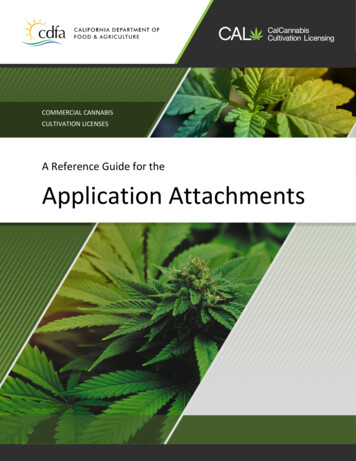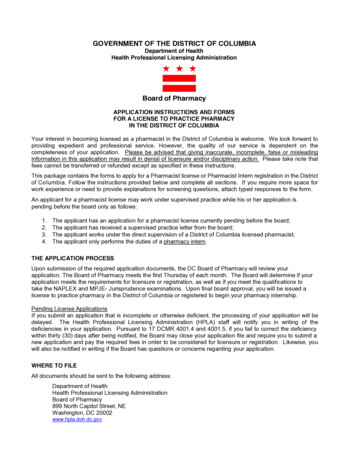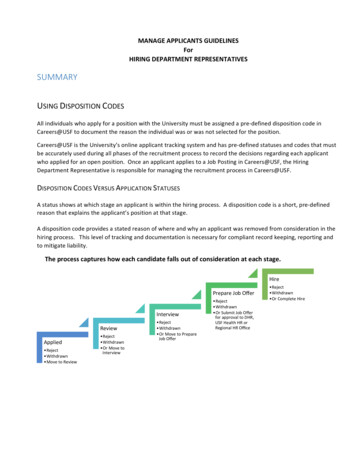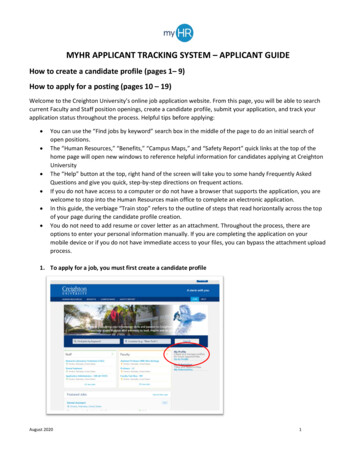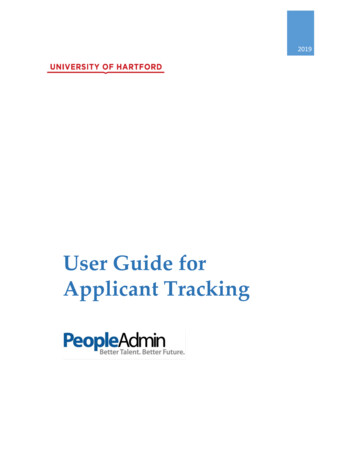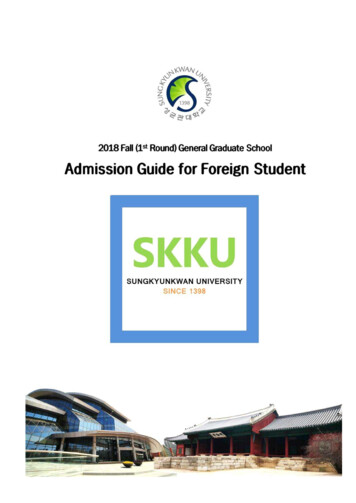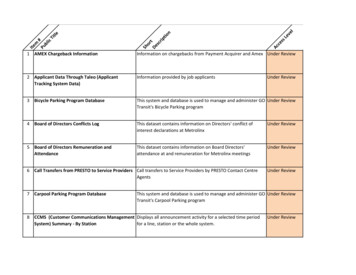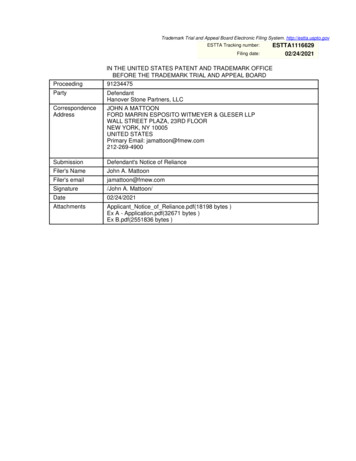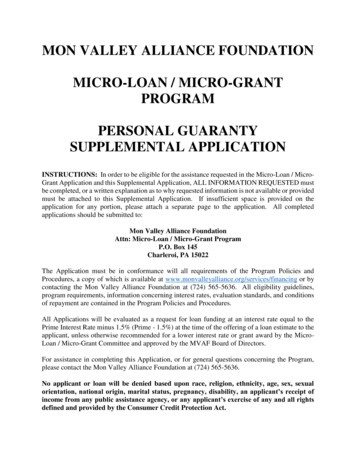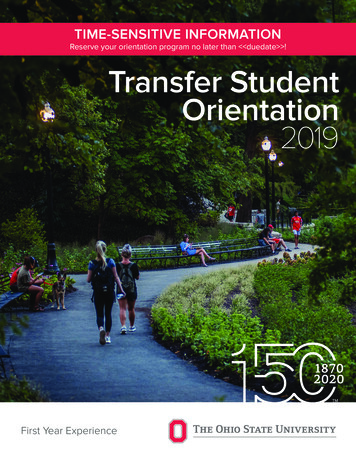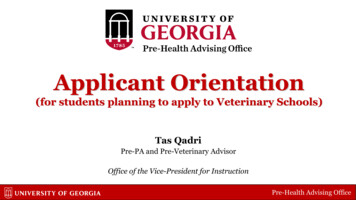
Transcription
Applicant Orientation(for students planning to apply to Veterinary Schools)Tas QadriPre-PA and Pre-Veterinary AdvisorOffice of the Vice-President for InstructionPre-Health Advising Office
Meet our Staff!Amanda Spohn (Coordinator)aspohn@uga.edudirpremed@uga.eduTaz Qadri (Pre-Physician Associate and Pre-Veterinary Advisor)tqadri@uga.eduMichele Johnson (Pre-Medical Advisor – Junior, Senior and Alumni)mtjohnson@uga.eduJennifer Letchuk (Pre-Medical Advisor – Freshman and Sophomore)jletchuk@uga.eduCasey Ellis (Pre-Nursing and Allied Health Advisor)cme18@uga.eduLise Kalla (Pre- Dental and Pre- Optometry Advisor)lkalla@uga.eduPre-Health Advising Office
About the Pre-Health Advising Office Our office advises all UGA students interested in healthcare careers. Medicine, dentistry, optometry, allied-health (PA, PT, OT, AA, GC), and nursing. We are located in 130 Memorial Hall Website: ppao.uga.edu Email: premed@uga.edu Phone: 706-542-0444 Visit our website: To join our Pre-Health UGA listservTo check out our Pre-Health Event Calendar for upcoming meetings/workshops/events.To make an appointment with a Pre-Vet Advisor.To download our Pre-Professional Planner on your IPhonePre-Health Advising Office
Upcoming Pre-Health EventsUpcoming Events Calendar:https://prehealth.uga.edu/resources/This is a great tool to review weekly to see all the great workshops andmeetings scheduled for our health and veterinarian clubs.It is updated regularly.Pre-Health Advising Office
Important Upcoming Application DatesFor the 2022-2023 application cycle: VMCAS (Vet Schools)January: Application OpensMay : Submit ApplicationPre-Health Advising Office
Orientation Overview Application and Timeline Components of Application Academic History Academic Transcripts and GPA GRE Supporting Information Shadowing/Animal Care ExperiencesActivitiesPersonal Statement/EssayLetters of Evaluation Where should I apply? Interviews Should I take a Gap-Year? What if I am not competitive?Pre-Health Advising Office
Veterinary School in Georgia * thereThere is only oneveterinary school inGeorgia located at UGA.Other schools you canlocate across the world byusing this link:University ofGeorgiaVeterinary MedicalSchool AdmissionRequirements (VMSAR)(applytovetschool.org)Pre-Health Advising Office
Application Centralized Application Services VMCAS – Veterinary school application The application has an instruction manual—download it! The Pre-Vet club also typically holds a meeting all about application services atthe end of the term. Be on the lookout for announcements! Submit your application as early as possible! Takes approximately 1-2 months to be verifiedPre-Health Advising Office
Supplemental Applications Most schools you apply to will also require that you submit asupplemental application. This is typically an application to the institution’s graduate school May also include short answer/essay questions. Usually linked through the CAS system, if the school participates in that service All portions of the supplemental application must be submitted for yourapplication to be considered complete Avoid repeating content from CAS essay in any potential supplementalessays/responses.Pre-Health Advising Office
UGA Veterinary Application TimelineInstitutionApplication PeriodMatriculation DateUniversity of GeorgiaJanuary-SeptemberAugust of the next yearPre-Health Advising Office
Primary Components of Application1. Academic History Overall GPA vs. Science/Prerequisite GPA Transcripts2. Exam Performance (GRE)3. Activities/Experiences Shadowing (Exposure to animal experience interaction)Volunteering (Commitment to helping others and community involvement)Leadership (Extracurricular engagement)Research4. Personal Statement and/or Essay(s)5. Letters of EvaluationPre-Health Advising Office
Academic History Overall GPA vs.Science/Prerequisite GPA Biology, Chemistry, Physics (BCP) 3.5-3.6 GPA is average for acceptedapplicants Trends Did you challenge yourself?Did you improve over time?Did you take your science courses at UGA?Do you have only 1-2 withdrawals? AP credit While many programs will accept AP credit,some do not so it is important to confirmwith programs of interest Transcripts: Submit an official transcript from everyinstitution you attended Request transcripts early as they can takeseveral weeks to send and process Refer to the application instructions regardingwhere to send transcripts and how to entercourseworkPre-Health Advising Office
Veterinary School Admission Requirements Always double-check with schools you are interested in! Requirements can change year-to-yearGeneral AA School RequirementsBiology I and II (BIOL 1107/L, BIOL 1108/L)Chemistry I and II (CHEM 1211/L, CHEM 1212/L)Organic Chemistry (CHEM 2211/L, CHEM2212/L)Physics I and II (PHYS 1111/L, PHYS 1112/L or PHYS1211 and 1212)Cell Biology (CBIO 2200/L, CBIO 2210/L, orother anatomy/physiology options)Statistics (STAT 2000 or BIOS 2010)Calculus (MATH 2250)Biochemistry (BCMB 3100 or 4010 or 4020)Psychology (PSYC 1101)VPHY 3100, PMCY 3000,CBIO 3710,3000, 3400, 4100 and other animalscience classes
Is AP credit accepted? The policies regarding acceptance of AP credit vary greatlyamongst veterinary programs across North America and the world. It is recommended to take all your BCP (biology, chemistry, andphysics) classes at the university you attend. Important to check with individual schools you hope to apply to.Pre-Health Advising Office
GRE Take the GRE no later than Spring/early Summer of the year you plan to apply Offered regularly; however, it will take a couple of weeks to receive your official scorereport and have that sent to programs of interest. Registration is rolling and can be completed via the University Testing Center on campus. Courses you need before the exam: No specific coursework is required pre-GRE since the “General Test” is required GRE scores range from 260-340 Try to score at least 310 (50th percentile) as a composite (combined) score 155 for quantitative, 155 for verbal, 4.0 writing You can study for the GRE on your own or take a GRE prep-course Key is to make a study plan and take practice tests!Pre-Health Advising Office
Supporting Information: Activities & Experiences Applicants use the Supporting Information/Experiences section toprovide detailed information about: Observation Hours: Time spent officially following and observing a veterinarian at work, preferably in small animals, largeanimals and exotic animals.Employment: Paid work done outside of the animal care field; for example, a retail or restaurant job.Extracurricular Activities: Includes research, club memberships, sports, etc. through a college or university.Research: Research projects done in addition to classroom work; research generally should NOT appear as credit on aschool transcript but may be acceptable for some programs (refer to instructions for specific application).Volunteer: Volunteer work done outside of the health care field; for example, working for Habitat for Humanity, tutoringstudents, participating in or working for a fundraiser walk or blood drive, etc. Anything you add is fair game for an interview! Include activities in which you were actively engaged.Highlight specific qualities (e.g., leadership, teamwork, compassion, etc.).Try to avoid including things in which you are a passive participant.Pre-Health Advising Office
Observation Hours and Animal Care Experience Keeping track of experiences It is recommended that you use our Pre-Professional Planner App that can befound on our website to keep track of your experiences—specifically yoursupervisor’s name and contact information, dates present, and hours accumulated. You may also want to make note of memorable experiences to draw from later forinterview/essay prompts Verifying Experiences Generally, application services will request the contact information of yoursupervisor for observation hours and animal care experiences. They will then contact this individual (usually via email) to electronically verifyyour experiences No physical signatures need to be obtained by you Good practice to follow up with providers before application opens to let them knowthis email is coming!Pre-Health Advising Office
Supporting Information: Personal Statement/EssayPersonal StatementEssay Prompt(s) Your chance to inform committeeabout yourself beyond transcript. Vet applications have supplementalapplication where you will be given an 3essay prompts Pay close attention to number of characters (notwords) that you can submitDO NOT exceed maximum lengthTriple-check for grammar and spelling errors! Need to answer these questions: Why do you want to be a veterinarian?Why do I want to pursue education in this field?What do you want schools to know about you thathasn't been disclosed in other sections of theapplication?Explain a defining moment that helped steer youtoward a career in this fieldCOVID essay included now Typically limed to 1 page (3,000 charactersincluding spaces) Start early! Give yourself at least twomonths to work on your statement. Have several people read it (letter-writers, advisor,etc.)UGA resources: Honors College, Career CenterPre-Health Advising Office
Supporting Information: Letters of Recommendation Most programs require three letters: You can upload up to six letters but the three listed are themost important 1 Veterinarian provider 1 professor (should be a science or in major or in prerequisite courses) Additional letter(s) from another academic professional, healthcare provider, supervisor, orsomeone who knows the you well enough to speak positively on your behalf. Letters should come from people who know you! Will need to describe you as an individual—behavior, character traits, maturity-level, etc. The Pre-Health Advising office no longer writes nor submits letters of evaluation. The absence of a committee or advisor letter will not negatively affect your application.Pre-Health Advising Office
How should I ask for Letters of Evaluation? Ask early! January-March of year you plan to apply. Keep in mind, though, that letters cannot be submitted until the applicationcycle officially opens Email about meeting in person, then ask for letter during meeting. Always ask whether they can write you a positive letter! Provide the following to your letter-writers: Resume or CVDraft of personal statement (if needed for application)Information about the programs you’re applying to and your goalsGuidelines for Letter-Writers handout (provided by Pre-Health Advising Office)Pre-Health Advising Office
How should my Letters be submitted? Programs that participate in the VMCAS system will have evaluators submitelectronically. All recommendations can be submitted electronically by recommenders usingLetters by Liaison, our Recommender Portal. Prepare your recommenders. Once you choose your recommenders, be sure toinform them about the process and that they will be completing therecommendation electronically. We recommend getting their preferred emailaddress and asking that they monitor that inbox for your recommendation request(which will come from vmcasinfo@vmcas.org), including any junk or spam folders. Always waive your right to view your letters of evaluation!Pre-Health Advising Office
Where should I apply? Recommend applying to several schools. Admissions are very fickle. Many variables affect likelihood of interview. There are no true “back-up” schools. Consider applying to out-of-state schools. State institutions are very particular about residency, private schools are not. Use the VMCAS Program Directory, as well as individual webpages Overview and admissions data for accredited programsReview necessary application materialsPre-Health Advising Office
Background Check Report anything you think might be an issue. Honor Code violations Legal issues (misdemeanors, felonies, etc.) Not reporting is considered the same as lying. If you have had a violation expunged, be sure to pull record and verify. If something happens after you apply or are accepted, you must report. Bottom-line, try to keep your nose clean!Pre-Health Advising Office
Interviews Most veterinary schools do not have interviews. If they do, then interview seasonbegins when VMCAS application closes in mid-September and will continue into theSpring. An invitation to interview typically means your “numbers” are good. Interviewers are trying to find out who you are. No right/wrong answers—more about how you answer and interpersonal communication skills. Tips: Know your application inside and out.Dress conservatively (no tattoos, minimal jewelry, beards trimmed, comfy shoes)Interview begins the minute you step on campusSend thank-you notes within 2-weeks of interview (email or hand-written) Career Center conducts mock interviews Schedule early! Try for Spring/Early Fall.Pre-Health Advising Office
Gap Year Why take a Gap Year? I didn’t get in. I am not ready to apply. I need a break from school. Work on weak spots in your application. Complete a post-bac Retake GRE Increase volunteering and animal experience Key to Gap Year is planning. Try to stay busy and do things that allow you to grow and cultivate new skillsPre-Health Advising Office
What if I am not competitive? It’s okay not to get in the first time! Plenty of people have to reapply. Take a Gap Year to work on becoming more competitive. Take additional courses or complete a graduate degree Re-take the GRE Seek out more volunteering and shadowing opportunities Consider another career with your completed Undergrad: Ecologist, environmental consultant, higher education lecturer, nature conservationofficer, scientific writer. Consider talking with a career consultant further about other career paths may bebest-suited to your strengthsPre-Health Advising Office
Fee Assistance ProgramsA limited number of fee waivers are provided by VMCAS to qualified applicants on a firstcome, first-served basis. Each fee waiver covers only the initial application fee, so if youwish to apply to additional programs, you are responsible for the remaining balance. Ifyou received a fee waiver during a previous cycle, you may still apply for another in thenext cycle.Keep in mind that fee waiver funds can be quickly depleted.There is a deadline for fee waiver requests to be submitted by.Qualification RequirementsThere are three types of fee waivers applicants can qualify for: Financial-based Service-based International-basedYou can only apply for one type of fee waiver per cycle.Pre-Health Advising Office
Recent Veterinary Admissions Data (2020-2021)University of GeorgiaNational 76/120 (accepted/verified applicants):63.3% acceptance rate Average applicant vs. accepted GPA:(Overall/Science) 3.56/3.48 vs. 3.49/3.52 Average applicant vs. accepted GRE: Verbal: 154 vs. 155 Quantitative: 153 vs. 154 Analytical/Writing: 4.0 Matriculated into 32 Veterinarianschools 41% acceptance rate Average Matriculant GPA: 3.6/3.5 Average Matriculant GRE Percentiles(for previous cycle since new data not yet available): Verbal: 61.4 Quantitative: 49.8 Analytical/Writing: 55.55 Gap Years: 50% of accepted students took atleast a full year off.Pre-Health Advising Office
Major Takeaways Plan out each move in advance! Submit your application as early as you can (but don’t rush it)! Always have a Plan B! Utilize the Pre-Health Advising Office! Join the Pre-Health listserv Meet with Pre-Vet Advisor Review our websitePre-Health Advising Office
Questions?Pre-Health Advising OfficeWebsite: ppao.uga.eduEmail: premed@uga.eduPhone: 706-542-0444To make an appointment with Pre-Vet Advisor, please visit website orlog onto SAGE.Pre-Health Advising Office
Michele Johnson (Pre-Medical Advisor - Junior, Senior and Alumni) mtjohnson@uga.edu. Jennifer Letchuk (Pre -Medical Advisor - Freshman and Sophomore) jletchuk@uga.edu. Casey Ellis (Pre -Nursing and Allied Health Advisor) cme18@uga.edu. Lise Kalla (Pre - Dental and Pre - Optometry Advisor) lkalla@uga.edu
